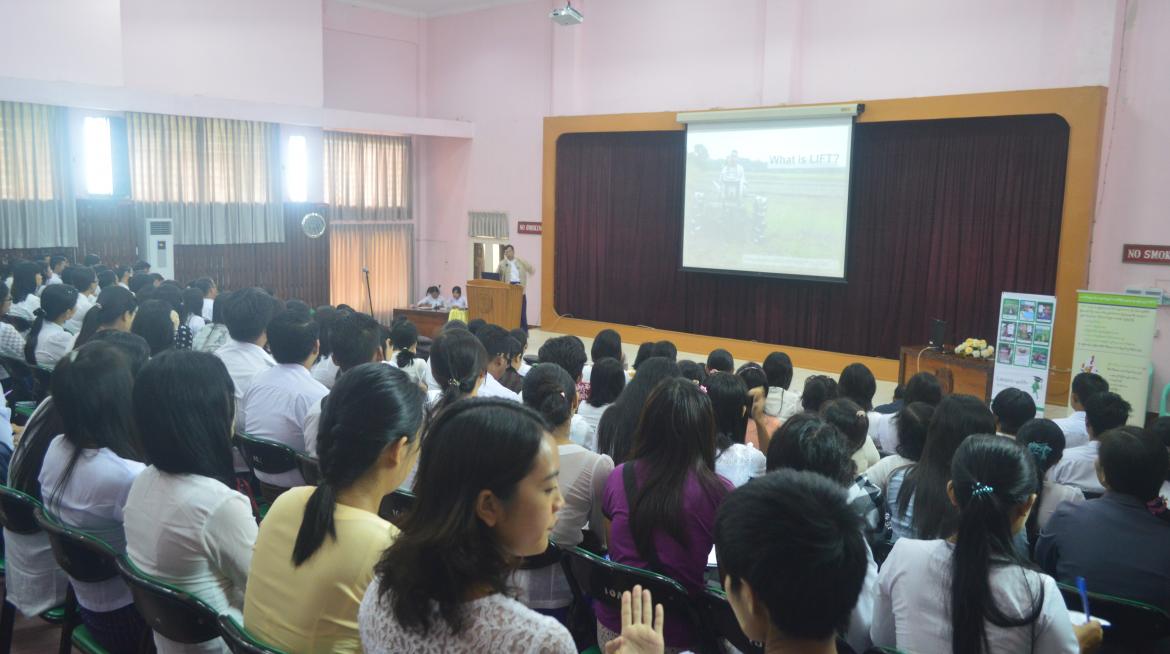
“My aim is to give back to my local community in Kachin with my expertise, particularly in this field of agriculture, after my graduation,” says Thawm Reim.
Thawm came to study at Yezin Agricultural University three years ago to major in biotechnology after he passed the matriculation exam. His native town is Hpakant, an area famous for jade that is in high demand not only in Myanmar but in the whole region. “Having natural resources in the area is a blessing, but it will not be sustainable. I may earn well in the mining field, but I want to build myself up with a quality education. Also, the majority of livelihoods in our country are made in agriculture; that is why I decided to study in this area,” said Thawm, confidently sharing his belief in study.
Like Thawm Reim, around 2,000 students from all over the country are studying agriculture-based subjects in Yezin Agricultural University. YAU, well-established since 1924, is the only institution of its kind in the country providing higher education specialized in agriculture. It is located in Pyinmana Township, 11 miles north of Myanmar’s capital Nay Pyi Taw, where it offers undergraduate, graduate and post-graduate studies specializing in agronomy, plant breeding, physiology and ecology, soil and water science, plant pathology, agricultural entomology, horticulture and agricultural biotechnology, and agricultural economics. Every year, YAU produces around 400 agricultural professionals through its undergraduate programmes, and a further 150 students graduate with master’s degrees.
Students in their final year of study undertake field practice, such as developing a demonstration plot on campus with new rice varieties. These practices add on to what the students have already learned in theory. “Field experience making demo plots is really helpful for our study, but this is limited with only one focus activity, so experiencing actual projects will let us learn a wider scope in practice,” said Thawm with hope.
“Our final year students are deployed to all States and Regions for an internship opportunity during the first semester; some are with private companies and NGOs, and some with government departments. However, we are facing challenges to provide opportunities for all students,” said Dr Myo Kywe, Rector of YAU, during a meeting with LIFT in August.
LIFT held a presentation about its works in Myanmar to YAU’s final year undergraduate students and faculty members on 7 August. “The first years of study are lectures only, but in the final year there are both lectures and field practice, so we have a very tight schedule. By having this kind of seminar from LIFT, we can learn briefly about what their rural development programmes are and how our study can fit with those when we work for the country after our graduation,” said final year student Myo Thinzar Lin, sharing her learning experience after the presentation, whose goal is to become an educator.
The Pro Rector of YAU, Daw Soe Soe Thein, said her students learned a lot after they came back from their internships. “They speak up a lot during discussions and share their knowledge with their classmates. These internships in projects and research programmes inspire them a lot.”
LIFT-funded projects are innovative and diverse, and are being implemented in over half the townships in the country. These programmes aim to deliver evidence-based results that contribute to policy development in Myanmar. LIFT is currently investigating possibilities to involve YAU in this process and support its students. There are potential openings, such as conducting thematic research or internship opportunities for students that bridge their academic knowledge and professional activities in development work. Internship experiences in projects would prepare students to cope with practical exercises in their studies, as well as giving them valuable knowledge which could be shared with their peers and lecturers.


